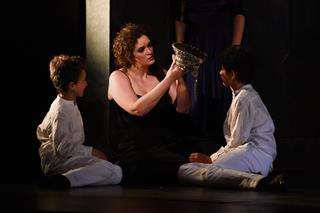|
Back
Médée, the Foresaken Beast Rouen
Opéra
05/22/2018 - & May 25, 27, 2018
Luigi Cherubini: Médée
Tineke van Ingelgem (Médée), Marc Laho (Jason), Jean-Marc Salzmann (Créon), Juliette Allen (Dircé), Yete Queiroz (Néris), Liesbeth Devos (First Maid), Inès Berlet (Second Maid)
Chœur accentus/Opéra de Rouen Normandie, Chloé Dufresne (Chorus Master), Orchestre de l’Opéra de Rouen Normandie, Hervé Niquet (Conductor)
Jean-Yves Ruf (Stage Director), Laure Pichat (Sets), Claudia Jenatsch (Costumes), Christian Dubet (Lighting)

T. van Ingelgem (© Gilles Abegg)
Premièred in Paris in 1797, the opera Médée was originally written in French to a libretto based on Euripides’ play from Greek Antiquity. It is the French original version that l’Opéra de Rouen presented. At its première, the work was tepidly received and mostly forgotten for over a century until Maria Callas revived it in an Italian version as a vehicle for her dramatic talent. The Italian version with which Callas fans are familiar is more condensed, with a reduced presence for roles other than the protagonist’s, probably rendering the Italian version more gruesome but also more powerful dramatically. On the other hand, an argument can be made for the harmony of balance by rendering a character such as Dircé, Glauce in the Italian version, more fully developed than just a virginal ingénue destined to perish by Médée’s machinations. Beyond these secondary differences, the Italian version is an early Romantic opera with sung recitatives, composed by Franz Lachner, while the French original is a pre-Romantic opéra comique in which spoken dialogue alternates with sung music. Therein lies the major flaw of the French original version. This formula of opéra comique has survived in operettas and some comic operas, such as Mozart’s Abduction from the Seraglio or Johann Strauss Jr’s Die Fledermaus. The only notable dramatic operas that purists have restored to that ineffective format is Carmen, a work so powerful that it could survive any destructive change. Thankfully, this performance of the restored French version was in the French city of Rouen with a mostly French cast and a French audience. This linguistic homogeneity makes the exercise more palatable. It is also to be noted that Rouen is the French playwright Pierre Corneille’s native town. His own adaptation of the Greek play was more familiar to the French public at the time of the opera’s creation, and possibly at the present time, than Euripides’.
In a comedy, understanding jokes is essential, therefore spoken dialogue in the public’s native tongue helps. But in a tragedy, the spoken and the sung music are two distinct idioms, each individually viable, but when juxtaposed, are mutually diminished. The spoken theatrical text is vapid contrasted with the sung music, and in turn the latter seems contrived and highly stylized when heard following spoken passages. In drama, these two idioms do not mix well.
The cast was led by Flemish soprano Tineke van Ingelgem, a force of nature, as the tragic princess/sorceress. It was admirable that a non-native speaker was able to sing and to act the spoken dialogue with such a command of the French language. Being Belgian, she is possibly bilingual from an early age. Only midway into the opera did her foreign accent appear, though subtly; it did not disturb or interrupt the dramatic flow. Her Act I aria, “Vous voyez de vos fils la mère infortunée,” moved to tears and her Act II opening aria, “O détestable hymen! O fureur! O vengeance!,” truly terrified. This is the proper portrayal of Médée: a wounded monster. Juliette Allen’s agile coloratura was ideally suited for the virginal Dircé. Her opening aria, “Hymen! Viens dissiper une vaine frayeur,” perfectly portrayed her fragility, submission and fear. Marc Laho’s lyric tenor may be a touch underpowered for the heroic role of Jason, though the perfidious ambitious Argonaut is really an anti-hero sacrificing the woman who betrayed her family to get him the Golden Fleece. The vocal limitations of the lyric voice helped make Jason’s character more credible as well as moving. This anti-hero is also a victim of circumstances, not a mere rapacious scoundrel. His Act I aria “Eloigné pour jamais d’une épouse cruelle” was elegantly sung.
Jean-Marc Salzmann portrayed a commanding Créon, King of Corinth. His bass had the right colour for the regal role. His first act aria, “C’est à vous de trembler, femme impie et barbare,” and in the preceding duet with Médée, he sounded appropriately unsympathetic. Yete Queiroz’s warm mezzo conveyed Néris’s quasi maternal love for her wounded mistress. Her Act II recitative and aria, “Malheureuse Princesse! ... Ah! Nos peines seront communes!,” was touching, though the French original is much less moving than the Italian “Medea, o Medea! Solo un pianto con te versare.”
The chorus, which plays a prominent role in this opera, and especially in the French version, was well-prepared and had clear diction that accentuated the drama. The orchestra under Hervé Niquet played stylishly in a manner that confirmed Cherubini’s lineage: the intermediary between Gluck and Berlioz. Some detrimental moments of silence were introduced once in a while as a tool of emphasis. They would have been effective had this been a play, but in the already unsettling mixed idiom of opera and theatre, they distracted.
Cherubini was considered by Beethoven as his most brilliant contemporary. A sampling of his string quartets, numerous masses and more obscure operas such as Ali Baba, Les Abencérages or Lodoïska attest to his formidable talent. The reason for his present day relative obscurity relates to the epoch. He is a late classicist but not yet a Romantic, writing in a transitional musical idiom. The music is not as overtly expressive as that of the Romantics. Also, like Etienne-Nicolas Méhul and François-Adrien Boieldieu, he was a composer of the brief French Revolutionary rule, a period that its successors wanted forgotten. Despite the merits of the performers of the Rouen production, it is doubtful that the championing of the French Médée will do much to give Cherubini his dues beyond French-speaking countries.
Ossama el Naggar
|